The Windows Phone 7 Review
by Anand Lal Shimpi & Brian Klug on October 20, 2010 7:00 PM EST- Posted in
- Smartphones
- Windows Phone 7
- Microsoft
- Mobile
The Keyboard
The virtual keyboard is software replaceable under Android. If you don’t like what comes on your phone just download another one. Microsoft took the Apple approach and doesn’t allow swapping of keyboards. Instead, Microsoft put together what it feels is the perfect virtual keyboard. While I won’t call it perfect, it is a nice blend of Apple’s simplicity and the text replacement bar you get with some Android keyboards.
Each keypress has an ultramodern typewriter sound to it. Hold down the shift key and you’ll hear an extra tap indicating that caps lock is now active.
There are three keyboard configurations by default if you’re typing in a text field. The default one is very similar to the iOS keyboard with a few android-like additions. You get a comma and period keys as well as the emoticon button. Tapping the latter gives you two pages of emoticons for your expressive needs.
Hit the &123 key and you’ll get numbers and symbols. Hit the right arrow and you’ll see the second page. The numbers remain intact across both symbol keyboards making typing complex passwords a bit easier.
Microsoft doesn’t inject as much key spacing into the keyboard as Apple does, which can throw off iOS users. The learning curve isn’t steep though. The keyboard will autocorrect simple errors. Corrections happen based on length of word typed and location of keys pressed. For more ambiguous errors it’ll present you with a list of options in a bar above the keyboard. You can tap to select a replacement or scroll left/right to find one that may not be among the top suggestions.
If a word incorrectly shows up as misspelled, tap once to highlight and hit the + key in the suggestion bar to add it to the dictionary.
There’s typically a separate confirm/send button below the keyboard for anything that’s a non-recoverable action (e.g. sending an SMS). This is so you don’t accidentally hit enter and send something when you thought you were putting a space in between some lines.
Of course the whole point of a virtual keyboard is that it should change based on the application. Windows Phone 7 is no exception. If you’re typing in a URL box you get a dedicated .com key for example. Typing in an email field gives you dedicated @ and .com key. The calculator app has its own custom keyboard layouts (one for portrait and one for landscape).
To position a cursor in iOS you tap and hold until you get a magnifying lens that helps you fine position your cursor. Android relies on arrow keys or a trackball (optical/physical). Windows Phone once again borrows from Apple. You tap and hold but instead of getting a magnifying lens, a theme-colored cursor appears above your finger. Simply drag your finger down and out of the way to position the cursor exactly where you want it. It feels awkward at first, but it makes a lot of sense once you get used to it.
Overall the keyboard is great. If you’re used to iOS, there’s a bit of an adjustment period but you’ll pick it up right away. If you’re coming from Android (except for Swype) I believe you’ll find it a pleasant balance between iOS and Android keyboards. And if you’ve never used a virtual keyboard before, you couldn’t have a better starting point.


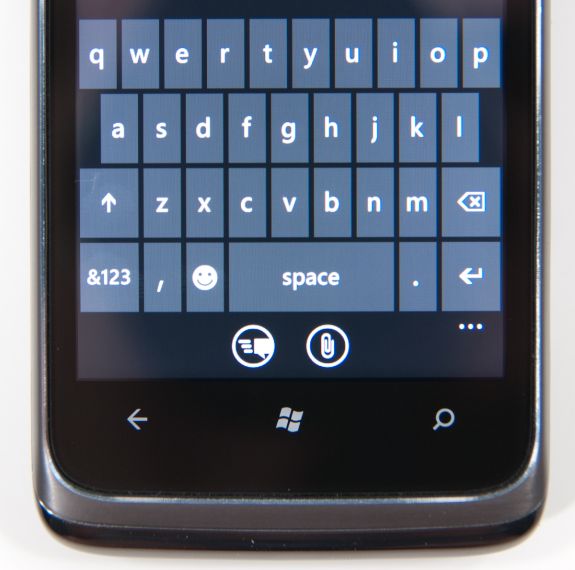
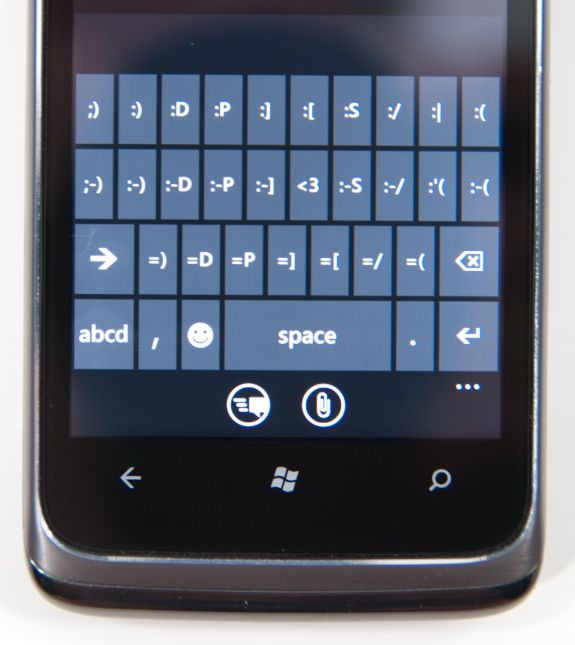
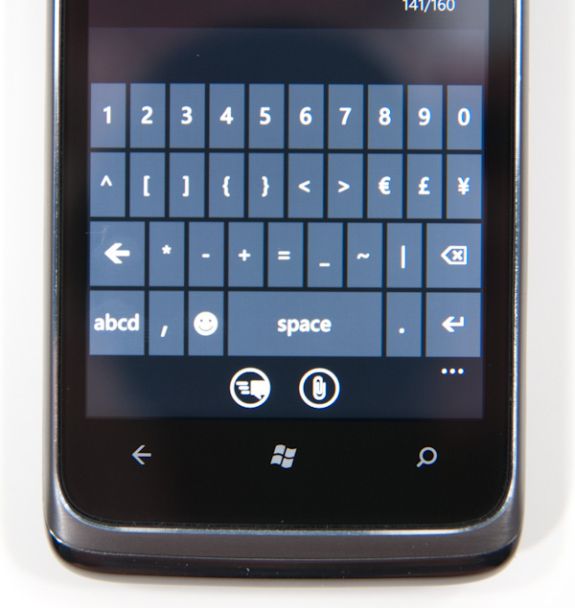
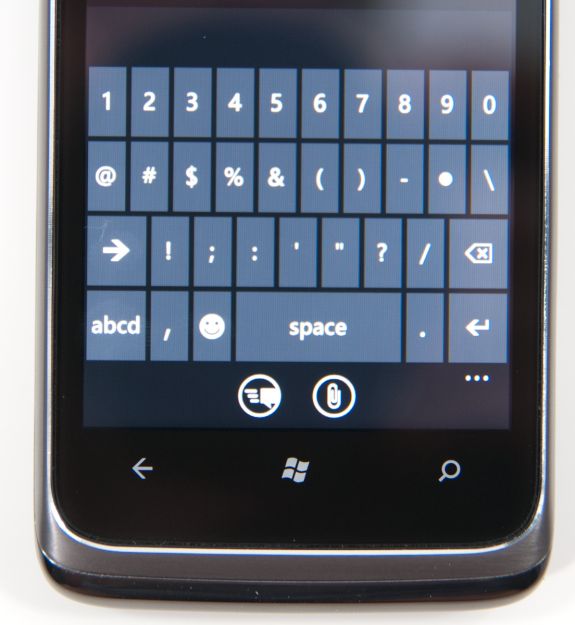
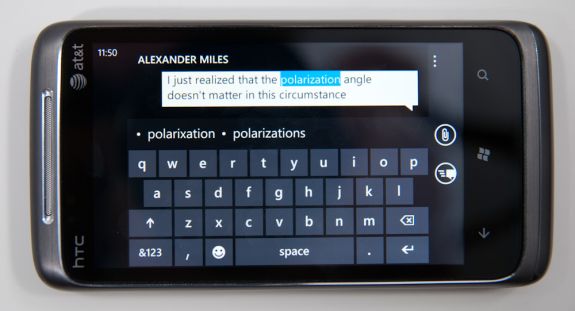








125 Comments
View All Comments
AssBall - Thursday, October 21, 2010 - link
LOL! Yeah, I think he needs to lay off the Ritalin.morphologia - Thursday, October 21, 2010 - link
Seems to me you are creating the problem yourself by caring about it so much. No one is forcing you to take such exception to political imagery. All you have to do is not care and the problem magically vanishes.Sheesh.
Fleeb - Saturday, October 23, 2010 - link
I did not even noticed that there is a Pepsi billboard in there up until you mentioned it. :SExelius - Wednesday, October 20, 2010 - link
Given the head start Apple and Google have, what are Microsoft's prospects with the carriers?Carrier support is obviously very important with licensed models like WP7 and Android... As Google learned with the Nexus One, what are Microsoft's prospects in mobile? Verizon is highly invested in Android, so don't look for them to push Android phones heavily, and AT&T is still riding Apple's cash cow... I don't think the two platform's positions are a coincidence.
Furthermore, is Microsoft prepared to potentially be the #3 mobile platform long-term? And that's assuming they can get out in front of RIM. I don't know that they have a chance of catching Google or Apple (Microsoft as a consumer brand is probably irreparably damaged and Google and Apple are still very popular.)
anactoraaron - Wednesday, October 20, 2010 - link
this is the #1 reason that I have right now for buying a WP7 phone. "Microsoft needs to pay the bills"??? Are you serious!?!? So their profits on Windows and Office are only for spending 1 billion on advertising and we get to eat it on seeing ads when I am searching through my email??? I can't understand the justification on not blasting MS here on this... which of their competitors do this now? This opens a door full of feces that I would rather not touch... Imagine turning on your phone to be bombarded by 3-10 ads before you can use the phone... and it starts with consumers being ok with an ad here and there while you do things not web related on your phone... "xbox live brought to your WP7 phone by Applebees- tap here to find the nearest applebees while your game loads"NO WAY MS... good try though. I guess it's up to Nokia/Intel with their meego to get my hard earned money... I am not paying for those ads on my phone - no way no how.
Smilin - Monday, October 25, 2010 - link
Which of their competitors do this now?Apple and Google that I'm aware of. Settle down beavis.
mcnabney - Wednesday, October 20, 2010 - link
Consumers know of three key smartphone products right now - Apple, Android, and RIM. The people that do know about Microsoft's previous offerings are probably still bitter.How will Microsoft overcome this deficit? They actually don't offer anything more than a nice slick interface that runs integrated functions smoothly, but falters on Apps. They won't even benefit from the latest must-have hardware - the launch phones are essentially 6 month old equipment.
RIM has always banked on the business customer, Apple with the trendy, and Android got everyone else. Well, they all have mature products now. Android was able to gain traction due to the iPhone/AT&T exclusivity which made them the only 'consumer targeted' smartphone on the other three American carriers. That was key to Android's success. There is no longer a pent-up demand for Microsoft to attach itself to.
What wasn't mentioned in the article is the competitive landscape for these devices. They will be going against superior Android hardware and a new version of the Pre. I just don't see much demand for these outside of the Zune-faithful.
lwatcdr - Thursday, October 21, 2010 - link
Yep it all comes down to on thing.Is Windows Phone 7 better in every way than IOS and Android. Frankly WebOS is also a very good mobile platform but is not getting anywhere near the buzz that it should.
Just being as good as just isn't enough when your competitors have a huge lead.
For me the big thing that WP7 offers will be ZunePass. If you are a music person that could be a huge benefit and it is a really good service I hear. I just don't think these devices are good enough and the lack of apps is a huge barrier.
AssBall - Thursday, October 21, 2010 - link
Remember the microsoft compatibility though. This OS has the potential to make for excellent corporate phones.teohhanhui - Monday, October 25, 2010 - link
Latest must-have hardware? That won't really matter to the average consumer. (And higher raw performance doesn't necessarily translate into better responsiveness, which greatly affects the user's perception of performance.)